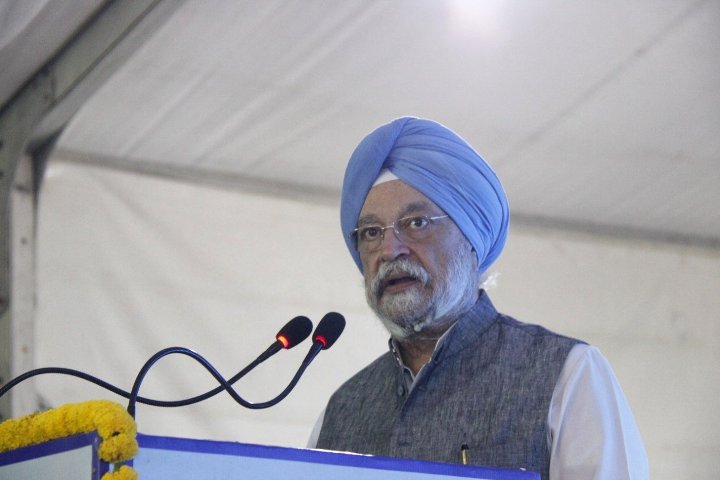At the 12th Edition of the CII Bioenergy Summit, Union Minister for Petroleum and Natural Gas, Shri Hardeep Singh Puri, highlighted India's remarkable strides in bioenergy, in line with the event's theme, “Fuelling the Future - Securing India’s Green Growth Goals.” Shri Puri praised India’s ethanol blending program, which has risen significantly from 1.53% in 2014 to a projected 15% by the end of 2024, and aims to hit 20% blending by 2025, ahead of schedule.
Shri Puri emphasized that the government is developing a roadmap for the post-20% blending phase, a crucial step in guiding India's next move towards energy sustainability and independence. The Minister credited Prime Minister Narendra Modi's leadership for transforming India’s bioenergy sector since 2014, noting how market dynamics, technological innovations, and progressive government policies have collectively driven the success of this initiative.
Impressive Outcomes of Ethanol Blending Program
Shri Puri shared key outcomes of India’s ethanol program over the past decade. Between 2014 and August 2024, the ethanol initiative saved ₹1,06,072 crore in foreign exchange, reduced CO2 emissions by 544 lakh metric tons, and substituted 181 lakh metric tons of crude oil. Additionally, oil marketing companies (OMCs) made payments of ₹1,50,097 crore to distillers, while farmers were paid ₹90,059 crore for ethanol production, empowering them to transition from "Annadata" (food-givers) to "Urjadata" (energy-givers).
Bio-Mobility and Sustainable Aviation Fuel (SAF)
Looking ahead, Shri Puri emphasized the government's ambitious bio-mobility targets, particularly for Sustainable Aviation Fuel (SAF). India aims for 1% SAF blending by 2027 and 2% by 2028, positioning itself as a global leader in sustainable aviation solutions. SAF is seen as a critical technology in decarbonizing hard-to-reach sectors like aviation and shipping.
India’s Growing Energy Demand and Bioenergy Market Expansion
Shri Puri highlighted India’s growing energy demand, driven by rapid economic expansion, predicting that the country will account for 25% of global energy demand over the next two decades. He stressed that bioenergy will play a key role in meeting this demand while advancing rural development and supporting the country’s green growth goals.
Citing data from Wood Mackenzie, the Minister noted that India’s bioenergy market, currently valued at $44 billion, is projected to grow to $125 billion by 2050. If global net-zero targets are achieved, the market could surge to $500 billion, providing India with substantial opportunities to lead in biofuel production and consumption.
Leveraging Biomass Potential and Agricultural Strength
India, recognized as an agricultural powerhouse, produces over 750 million metric tons of biomass annually, with two-thirds used domestically for purposes like cattle feed and fertilizer. Shri Puri noted that 32% of India’s primary energy consumption currently comes from biomass, and over 70% of Indians depend on it for energy in various capacities. With this vast agricultural and biomass potential, India is well-positioned to expand its bioenergy production and reduce its reliance on fossil fuels.
Global Biofuels Alliance and International Collaboration
Shri Puri highlighted India’s international leadership in biofuels, particularly through the Global Biofuels Alliance (GBA), which aims to unlock a $500 billion opportunity by facilitating knowledge-sharing, policy development, and technological advancements in biofuels. He also emphasized India’s strong collaboration with Brazil, a major player in biofuels, to enhance energy security and cut carbon emissions, especially in sectors that are difficult to decarbonize.
Government Initiatives to Support Biofuel Growth
The Minister pointed to several government incentives supporting ethanol and biofuel production, including tax exemptions, financial support for distilleries, and policies that encourage private sector investment in bioenergy. Shri Puri commended the efforts of industry leaders, researchers, and innovators in driving bioenergy growth, calling for even greater collaboration across sectors to build a robust, sustainable bioenergy ecosystem.
A Call to Action
In his closing remarks, Shri Puri underscored the shared responsibility for fueling India’s green growth, extending beyond government initiatives to include industry, academia, and the public. He urged stakeholders to work together to ensure India not only meets its energy needs but also sets a global standard in bioenergy innovation.
With its comprehensive bioenergy strategy, India is well on its way to becoming a global leader in sustainable energy, transforming its agricultural sector and reducing reliance on fossil fuels while driving economic growth and environmental sustainability.











